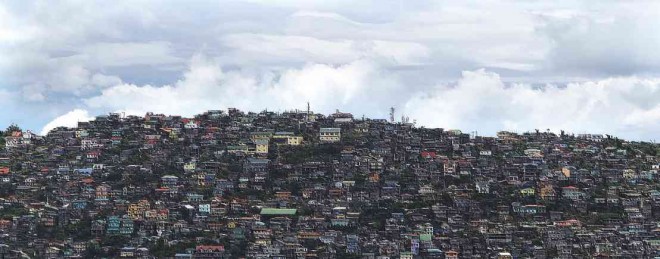Population growth, climate change link seen

Climate change disasters reveal how important population management is in coping with weather-triggered disasters. Many cities, like Baguio, are confronted by that reality each day the number of houses displaces trees from Baguio’s mountains. EV ESPIRITU/INQUIRER NORTHERN LUZON
BAGUIO CITY, Philippines—The Supreme Court decision declaring the reproductive health law constitutional came at the right moment, in light of evidence that managing the country’s population is vital in coping with the impact of climate change, speakers at a health and environment conference here said on Wednesday.
Super Typhoon Yolanda had provided policy makers a view of how seriously the poor suffer from extreme weather calamities, Dr. Juan Antonio Perez, executive director for the Commission on Population (Popcom), said in a speech during the 5th National Population, Health and Environment Conference here.
Perez, in a speech read for him by Popcom Deputy Executive Director Rosa Marcelino, said he helped document these experiences when he joined the inspection of isolated and poor areas in Coron town, Palawan province, where indigenous Filipinos live.
Worse for the poor
Yolanda exited the country through Coron in November 2013, after rampaging through the Visayas and leveling Tacloban City.
“Environmental impacts, including climate change, affect the lives of all people,” said Perez, a member of the Pantawid Pamilyang Pilipino Program national advisory committee.
“Yet the impacts of climate change are likely to be worse for the poor and the marginalized, who have contributed little to greenhouse gas emissions and at the same time lack the resources and societal support to adapt effectively to current and future changes,” he said.
Citing a report from the Senate Economic Planning Office, he said the poor were most vulnerable because they are dependent on climate-sensitive resources, like farming.
He said they were happy that the high court gave the “go signal to pursue the objective and spirit of providing universal access to sexual and reproductive health.”
100M population
Last month, the court ruled on the constitutionality of the RH law (Republic Act No. 10354 or the Responsible Parenthood and Reproductive Health Act of 2012).
Perez said the country’s population had reached 93 million as of 2010, and may reach 100 million at the end of the year, given “the relatively high fertility of women of reproductive age compounded by an increasing trend of teenage pregnancy.”
He said a growing population has an impact on the quality of the environment because it increases pollution and diminishes forest lands in favor of farms to produce more food.
Danilo Songco, president of PinoyME Foundation, told conference participants that the government had acknowledged that the poor suffer most from disasters.
This, he said, increases pressure on the government to assert the impact of population on its poverty reduction policy.
He said the Aquino administration had pushed a “new jargon” called “inclusive growth,” which requires all government projects to lead to “rapid economic growth that matters to everyone.”
Population management was not expressed in the Philippine Development Plan, Songco said, but it should now be part of the government’s plan to dramatize reforms and curb poverty.—Vincent Cabreza